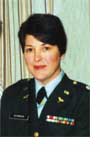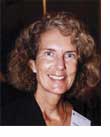Sheila Teague Bowman’67
Susan Gardner ’68
Lisa Grimes Firth ’97 Accelerated
An Unexpected Career Turn
 When Sheila Teague Bowman quit her job at Hopkins Hospital to join the Army, she recalls, “People looked at me and said, ‘Have you lost your mind?’” But that decision, she says, was the best one she ever made.
When Sheila Teague Bowman quit her job at Hopkins Hospital to join the Army, she recalls, “People looked at me and said, ‘Have you lost your mind?’” But that decision, she says, was the best one she ever made.
Now officially retired after 21 years of military service, Bowman is working as a special consultant to the Army Surgeon General, Lt. Gen. James Peake. She oversees more than 30 organizations that perform services for all three branches of the military. The Armed Forces Epidemiology Board, for example, studies and makes recommendations on infectious diseases—such as SARS—and chemical or biological casualties that affect the armed services. The war in Iraq, she says, has dramatically increased her workload.
Bowman went into active duty in 1980 after five years in the Reserves. At the time, she was an administrative nurse in pediatrics at Hopkins Hospital; she had received a master’s degree from Hopkins School of Public Health in 1975 as well as an MBA from Loyola College in 1981. As a recruiter in the Reserves, she had helped the Army Surgeon General bring more physicians into the armed forces. Bowman had a good track record in recruiting and was eventually asked to come on as a full-time recruiter. “I enjoyed recruiting,” she says. “I had the opportunity to express patriotism.”
She went on to become a personal advisor on medical issues and personnel strategies for the Assistant Secretary of Defense for Reserve Affairs, and her final assignment before retirement in 1996 was advising the Assistant Secretary of Defense for Health Affairs on medical readiness training—that is, ensuring that medical personnel have the skills required to perform in a combat environment and that non-medical personnel can perform basic non-medical lifesaving or “buddy aid.”
After her retirement, Bowman worked as an independent consultant, writing reports for Congress on behalf of the Department of Defense and the Veterans Administration. In 2001 she began consulting for the President’s Task Force to Improve Health Care Delivery for Veterans in collaboration with the Department of Defense.
As a nursing student, Bowman never expected to one day be in the military, although she has always considered herself patriotic. “I’ve always realized how fortunate we are in this country; we often don’t
see our responsibilities and obligations in relation to that.” When she graduated in 1967, Bowman said, “Viet Nam was just ramping up. There were a lot of recruiters on campus.” And though she toyed with the idea of enlisting, she said, “My parents were horrified at the thought.”
Nevertheless, Bowman’s nursing background prepared her for her unexpected career path. “We received a firm foundation in basic physiology, disease process, and patient care,” she says. “But at the same time, we learned administrative skills and how to work as team leaders. In the military, I’ve had to fully understand the health care system, the full team concept, and how nurses fit in.”
Today, when Bowman isn’t consulting for the Army, she works on crafts projects and gardening. She intends to convert her barn (she recently renovated a 150-year-old farmhouse) into a crafts store.
—Martha Thomas
In the Right Regulatory Spot
When people think of the Food and Drug Administration, they generally think of drugs, lengthy approvals, and patent controversies says Susan Gardner ’68. But Gardner’s department, the Office of Surveillance and Biometrics, which is part of the FDA’s Center for Devices and Radiological Health, oversees products ranging from surgical gloves to life support devices.
Gardner is director of an office charged with monitoring products that have already made it to the marketplace, tracking the performance of medical items, and making sure they are being used properly. “Sometimes even older technology can present problems if devices are being used improperly,” she says. Mandatory reporting by manufacturers, along with voluntary reports filed by health care providers via an FDA internet site (Medwatch)fill the office database with some 100,000 reports of “adverse events” each year. “We’re constantly watching to see when unexpected problems arise, especially if certain events are repeated,” she explains.
This, she says, “means we have to be as knowledgeable about the products as the company that makes them.” One of the hottest issues currently involves breast implants. While silicone products were removed from the market several years ago, manufacturers have recently petitioned to have them re-approved. “There are huge camps of consumers on both sides,” Gardner says. But she is not troubled: One of the department’s mottos, she says, is, “If everyone is mad at us, we know we are in the right spot.”
After receiving her PhD in medical sociology from Catholic University in 1980, Gardner began working for the health care division of Westat, a research company that had contracts with government agencies to conduct surveys. While at Westat, she worked for the National Cancer Institute on several studies. A colleague at the Cancer Institute moved to the FDA in 1995 and invited Gardner to come along as deputy director to the position she currently holds. She was appointed director of the office in 2002 after a year as acting director.
Gardner describes the field of nursing as “one of the toughest jobs” she has had. “The intellectual, emotional, and physical demands prepare you for whatever you do in life,” she says. Along with instilling skills in “prioritization and organization,” she says, “nursing gives you perspective.” She recalls a situation at her current workplace. “It was really just a case of someone making unreasonable demands.” One of her colleagues admired Gardner’s ability to stay cool in a crisis, she says. “I said, ‘This isn’t a crisis. Nobody is going to die.’”
—Martha Thomas
A Different Twist on Preventing HIV
Lisa Grimes Firth’s move to Sante Fe, New Mexico, was not part of her career plan. But she made the transition willingly for her husband’s job. After all, she owed him one: the couple’s previous move had been from Washington, DC, to Phnom Penh, Cambodia, so that Firth could set up and train a network of health care providers to work on reproductive health, family planning and testing, and counseling for HIV. The program, for the non-profit Population Services International (PSI), also emphasized “social marketing,” says Firth – using local television shows and creating commercials to educate about HIV and preventive health. “It was kind of a different twist on health development programs,” she says.
After completing the accelerated nursing program in 1997 and receiving her master’s in public health at Hopkins in 1999, Firth went to work for PSI, an international organization based in Washington. Her work involved managing programs in malaria, HIV-prevention, and mother and child health in east and southern Africa, and she traveled to several countries in Africa and to Pakistan as part of her job. In 2001, she was offered the opportunity to live in Cambodia as a reproductive health specialist, and her husband Charlie Firth, an attorney, went along, finding work with the Cambodian government drafting environmental protection legislation.
International aid work was not new to Grimes. Before nursing school, she had worked for the Peace Corps in Niger.
Cambodia, Firth points out, “has the highest HIV prevalence in Asia.” The pandemic, she says “is consuming so many countries around the world. I wanted to help people make decisions that would decrease risky behaviors; I wanted to empower people to take care of their own health.”
The couple lived in Cambodia for two years. During that time, Grimes successfully established a network of doctors, midwives, and other health workers who receive consistent training in spotting and treating sexually transmitted diseases as well as counseling patients. She helped to develop an easily recognizable logo that network members can display, ensuring that their services meet certain standards.
When her husband landed a job with a Santa Fe law firm (his interview was held in Honolulu), the couple decided to return to the United States, where Firth found a job as a clinical nurse with Southwest CARE Center, a non-profit clinic for HIV clients in northeastern New Mexico. Though she misses working on the preventive side, developing new programs, she says, “it’s nice to be in a place where resources are available for people who are infected.”
